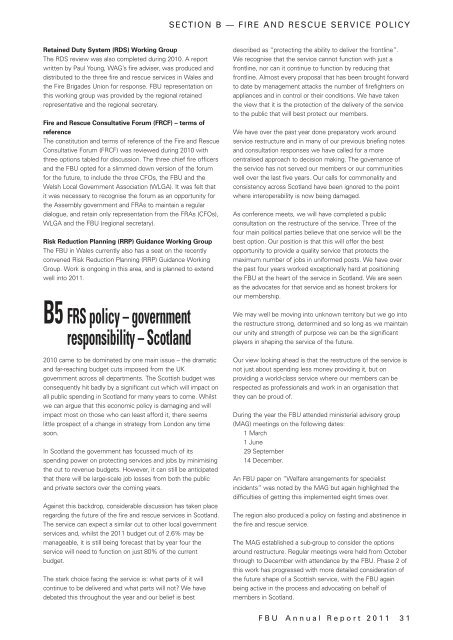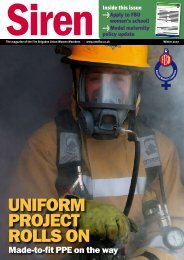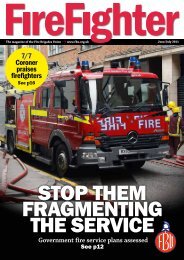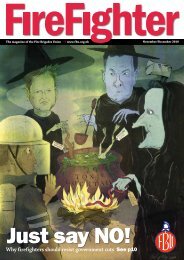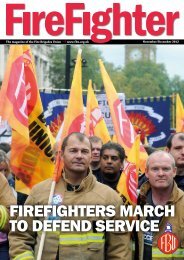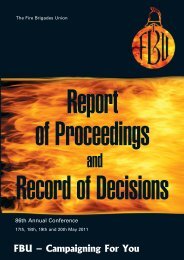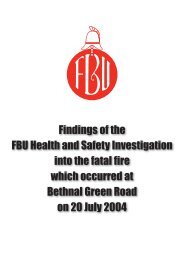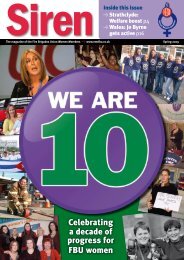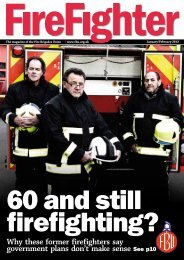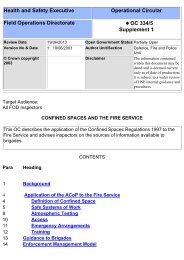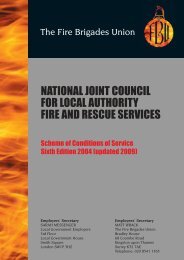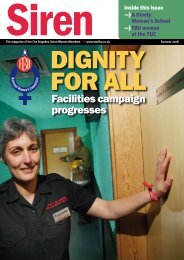Report - Fire Brigades Union
Report - Fire Brigades Union
Report - Fire Brigades Union
You also want an ePaper? Increase the reach of your titles
YUMPU automatically turns print PDFs into web optimized ePapers that Google loves.
SECTION B — FIRE AND RESCUE SERVICE POLICY<br />
Retained Duty System (RDS) Working Group<br />
The RDS review was also completed during 2010. A report<br />
written by Paul Young, WAG’s fire adviser, was produced and<br />
distributed to the three fire and rescue services in Wales and<br />
the <strong>Fire</strong> <strong>Brigades</strong> <strong>Union</strong> for response. FBU representation on<br />
this working group was provided by the regional retained<br />
representative and the regional secretary.<br />
<strong>Fire</strong> and Rescue Consultative Forum (FRCF) – terms of<br />
reference<br />
The constitution and terms of reference of the <strong>Fire</strong> and Rescue<br />
Consultative Forum (FRCF) was reviewed during 2010 with<br />
three options tabled for discussion. The three chief fire officers<br />
and the FBU opted for a slimmed down version of the forum<br />
for the future, to include the three CFOs, the FBU and the<br />
Welsh Local Government Association (WLGA). It was felt that<br />
it was necessary to recognise the forum as an opportunity for<br />
the Assembly government and FRAs to maintain a regular<br />
dialogue, and retain only representation from the FRAs (CFOs),<br />
WLGA and the FBU (regional secretary).<br />
Risk Reduction Planning (RRP) Guidance Working Group<br />
The FBU in Wales currently also has a seat on the recently<br />
convened Risk Reduction Planning (RRP) Guidance Working<br />
Group. Work is ongoing in this area, and is planned to extend<br />
well into 2011.<br />
B5 FRS policy – government<br />
responsibility – Scotland<br />
2010 came to be dominated by one main issue – the dramatic<br />
and far-reaching budget cuts imposed from the UK<br />
government across all departments. The Scottish budget was<br />
consequently hit badly by a significant cut which will impact on<br />
all public spending in Scotland for many years to come. Whilst<br />
we can argue that this economic policy is damaging and will<br />
impact most on those who can least afford it, there seems<br />
little prospect of a change in strategy from London any time<br />
soon.<br />
In Scotland the government has focussed much of its<br />
spending power on protecting services and jobs by minimising<br />
the cut to revenue budgets. However, it can still be anticipated<br />
that there will be large-scale job losses from both the public<br />
and private sectors over the coming years.<br />
Against this backdrop, considerable discussion has taken place<br />
regarding the future of the fire and rescue services in Scotland.<br />
The service can expect a similar cut to other local government<br />
services and, whilst the 2011 budget cut of 2.6% may be<br />
manageable, it is still being forecast that by year four the<br />
service will need to function on just 80% of the current<br />
budget.<br />
The stark choice facing the service is: what parts of it will<br />
continue to be delivered and what parts will not? We have<br />
debated this throughout the year and our belief is best<br />
described as “protecting the ability to deliver the frontline”.<br />
We recognise that the service cannot function with just a<br />
frontline, nor can it continue to function by reducing that<br />
frontline. Almost every proposal that has been brought forward<br />
to date by management attacks the number of firefighters on<br />
appliances and in control or their conditions. We have taken<br />
the view that it is the protection of the delivery of the service<br />
to the public that will best protect our members.<br />
We have over the past year done preparatory work around<br />
service restructure and in many of our previous briefing notes<br />
and consultation responses we have called for a more<br />
centralised approach to decision making. The governance of<br />
the service has not served our members or our communities<br />
well over the last five years. Our calls for commonality and<br />
consistency across Scotland have been ignored to the point<br />
where interoperability is now being damaged.<br />
As conference meets, we will have completed a public<br />
consultation on the restructure of the service. Three of the<br />
four main political parties believe that one service will be the<br />
best option. Our position is that this will offer the best<br />
opportunity to provide a quality service that protects the<br />
maximum number of jobs in uniformed posts. We have over<br />
the past four years worked exceptionally hard at positioning<br />
the FBU at the heart of the service in Scotland. We are seen<br />
as the advocates for that service and as honest brokers for<br />
our membership.<br />
We may well be moving into unknown territory but we go into<br />
the restructure strong, determined and so long as we maintain<br />
our unity and strength of purpose we can be the significant<br />
players in shaping the service of the future.<br />
Our view looking ahead is that the restructure of the service is<br />
not just about spending less money providing it, but on<br />
providing a world-class service where our members can be<br />
respected as professionals and work in an organisation that<br />
they can be proud of.<br />
During the year the FBU attended ministerial advisory group<br />
(MAG) meetings on the following dates:<br />
1 March<br />
1 June<br />
29 September<br />
14 December.<br />
An FBU paper on “Welfare arrangements for specialist<br />
incidents” was noted by the MAG but again highlighted the<br />
difficulties of getting this implemented eight times over.<br />
The region also produced a policy on fasting and abstinence in<br />
the fire and rescue service.<br />
The MAG established a sub-group to consider the options<br />
around restructure. Regular meetings were held from October<br />
through to December with attendance by the FBU. Phase 2 of<br />
this work has progressed with more detailed consideration of<br />
the future shape of a Scottish service, with the FBU again<br />
being active in the process and advocating on behalf of<br />
members in Scotland.<br />
FBU Annual <strong>Report</strong> 2011 31


